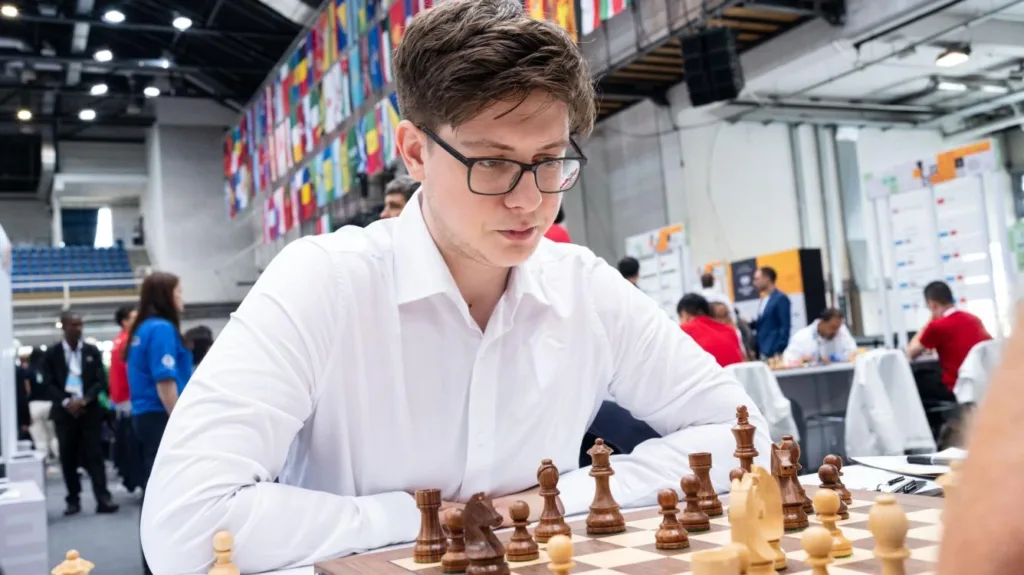The International Chess Federation (FIDE) has delivered one of the harshest sanctions in modern chess history, stripping Romanian-Ukrainian player Kirill Shevchenko of his grandmaster (GM) title and suspending him from all FIDE-rated events for three years, following a cheating scandal at the Spanish Team Championship in 2024. The ruling, announced on 29 August 2025, marks the fourth time in chess history that a grandmaster has been formally stripped of the title, putting Shevchenko alongside some of the most notorious names in chess ethics cases.
The Incident in Spain
The controversy began in October 2024 during the Spanish Team Championship, when Shevchenko was caught with a mobile phone in the restroom during play. According to the official case file, arbiters discovered a phone accompanied by a handwritten note in the bathroom. A cleaning staff member later confirmed that another phone had been found in the same location a day earlier.
Shevchenko was expelled from the tournament on suspicion of using external assistance. He subsequently admitted, in written communication to the FIDE Fair Play Commission (FPL), that he had accessed the Lichess application on the device during play. This confession significantly shaped the disciplinary proceedings that followed.
Initial Sanction and Appeals
In the first ruling, issued by the EDC First Instance Chamber, Shevchenko was found guilty of violating Article 11.7(e) of the FIDE Disciplinary Code. He was handed a three-year worldwide ban, with one year of the sentence suspended on the condition of no further misconduct until October 2027.
However, the chamber stopped short of revoking his grandmaster title, a decision that immediately triggered debate.
Two appeals followed. Shevchenko appealed, arguing that the punishment was “grossly disproportionate” given that his actions amounted only to an “attempt” to cheat rather than completed cheating. He requested a reduction of the ban to 12 months, with the provisional suspension counted, and demanded that FIDE cover more than CHF 10,000 in legal fees.
At the same time, the FIDE Fair Play Commission cross-appealed, insisting that the sanctions were too lenient. They argued that distinguishing between attempted and completed cheating was a misinterpretation of the code, and stressed that even possession of a device during a game constitutes a violation. The FPL pushed for the additional symbolic measure of stripping Shevchenko of the GM title, warning that anything less would set a dangerous precedent.
The Appeal Chamber’s Final Verdict
On August 29, 2025, the Appeal Chamber of the FIDE Ethics and Disciplinary Commission, chaired by Yolander Persaud with members Khaled Arfa and Ravindra Dongre, delivered its unanimous verdict.
- Shevchenko’s appeal was dismissed.
- The FPL’s cross-appeal was upheld.
- Shevchenko’s guilt under Article 11.7(e) was reaffirmed.
- His three-year worldwide ban was confirmed, with one year suspended (from 19 October 2024 to 18 October 2026, probation until October 2027).
- His grandmaster title was revoked, effective immediately.
- His request for legal fees was rejected.
The chamber emphasized that confession and possession of a phone during a FIDE event are sufficient to establish cheating, dismissing the “attempted cheating” defense. Furthermore, they ruled that the failure to revoke the GM title in the initial ruling was an “inappropriate sanction” given precedents such as Gaioz Nigalidze and Igors Rausis, both of whom had their titles stripped after being caught cheating with phones during tournaments.
The Symbolism of Losing the GM Title
The revocation of Shevchenko’s grandmaster title is a rare and symbolic punishment. Only three players before him have lost the title:
- Ion Crișan (Romania) – titles revoked in 2015 after it was revealed that he had fabricated tournaments and results to obtain his GM status.
- Gaioz Nigalidze (Georgia) – stripped in 2015 after being caught using a smartphone hidden in a bathroom during the Dubai Open.
- Igors Rausis (Latvia/Czech Republic) – stripped in 2019 after being caught with a phone in a toilet during the Strasbourg Open.
Shevchenko now joins this infamous list as the fourth GM in history to be formally stripped of the title.
For a 22-year-old player once seen as a rising star, the decision is career-shattering. The GM title is not just an accolade but also a credential for invitations to elite events, endorsements, and long-term reputation. Its loss signals a permanent stain on his legacy.
FIDE’s Message on Fair Play
FIDE officials underlined that the decision was not just about one player, but about protecting the integrity of chess itself.
“FIDE takes cheating cases among top players with the utmost seriousness. We are working hard on both prevention and swift, appropriate sanctions. Ensuring fair play is non-negotiable – it is essential to the credibility and future of our sport,” said Dana Reizniece, Deputy Chair of the FIDE Management Board.
The ruling reflects FIDE’s broader efforts in recent years to combat the growing challenge of cheating in chess, especially with the rise of strong mobile chess engines and online play. FIDE’s Fair Play, Arbiters, and Ethics divisions have invested in detection systems, training arbiters, and ensuring that sanctions are severe enough to deter future misconduct.
Reaction Within the Chess World
While many applauded the firmness of the ruling, reactions were divided. Supporters argue that the revocation of the GM title was necessary to maintain trust in professional chess, particularly at a time when the game’s reputation has been tested by several high-profile scandals.
Others, however, questioned whether the punishment was too severe for a young player who admitted his mistake. Shevchenko’s supporters note that he was caught early in his career, and that rehabilitation, rather than symbolic stripping of titles, might better serve the sport.
Still, history suggests that once the GM title is revoked, it is never restored. For Shevchenko, even after serving his ban, he will return to competitive play as an International Master at best, with the difficult task of rebuilding his career and reputation from scratch.
Wider Context: Cheating and Chess Integrity
The Shevchenko case is the latest in a troubling pattern of top-level cheating incidents involving electronic devices. Nigalidze in 2015, Rausis in 2019, and now Shevchenko in 2024 all involved smartphones hidden in bathrooms, revealing how technology continues to test the sport’s security protocols.
FIDE has consistently escalated its response: from suspensions and bans in the past, to now the clear message that even grandmaster titles are not untouchable. The ruling also comes against the backdrop of public debates about cheating sparked by the Magnus Carlsen – Hans Niemann controversy in 2022, which placed integrity issues under the global spotlight.
The Road Ahead for Shevchenko
At just 22, Shevchenko’s playing career is effectively paused until 2026. Even after the ban expires, he will carry the stigma of being one of the very few players stripped of the GM title. Invitations to elite events may dry up, and sponsors are unlikely to associate with him in the near future.
His only recourse now lies in appealing the ruling to the Court of Arbitration for Sport (CAS) within 21 days. However, given his confession and FIDE’s unanimous verdict, the prospects of overturning the decision appear slim.
Conclusion
The case of Kirill Shevchenko is a watershed moment for modern chess. It demonstrates FIDE’s resolve to protect the sport’s credibility, even if it means taking down a young rising star. By revoking the GM title, FIDE has sent a powerful warning: cheating will not only cost players tournaments and rankings – it can strip them of their very identity in the game.
For Shevchenko, once celebrated as one of the brightest young talents in Europe, the verdict transforms him into a cautionary tale. For chess, the ruling is both a painful scandal and a reaffirmation that in the 64-square world, integrity remains the ultimate checkmate.

I’m a passionate board game enthusiast and a skilled player in chess, xiangqi and Go. Words for Attacking Chess since 2023. Ping me at Lichess for a game or chat.

